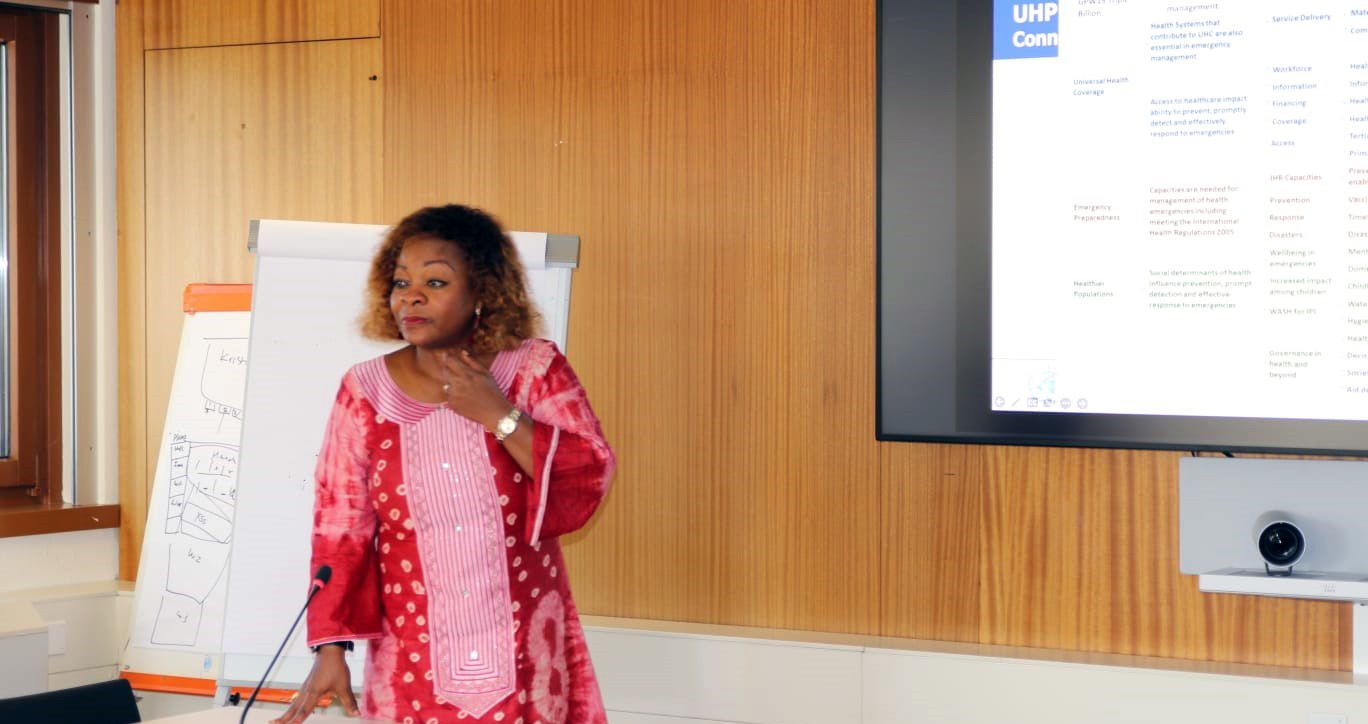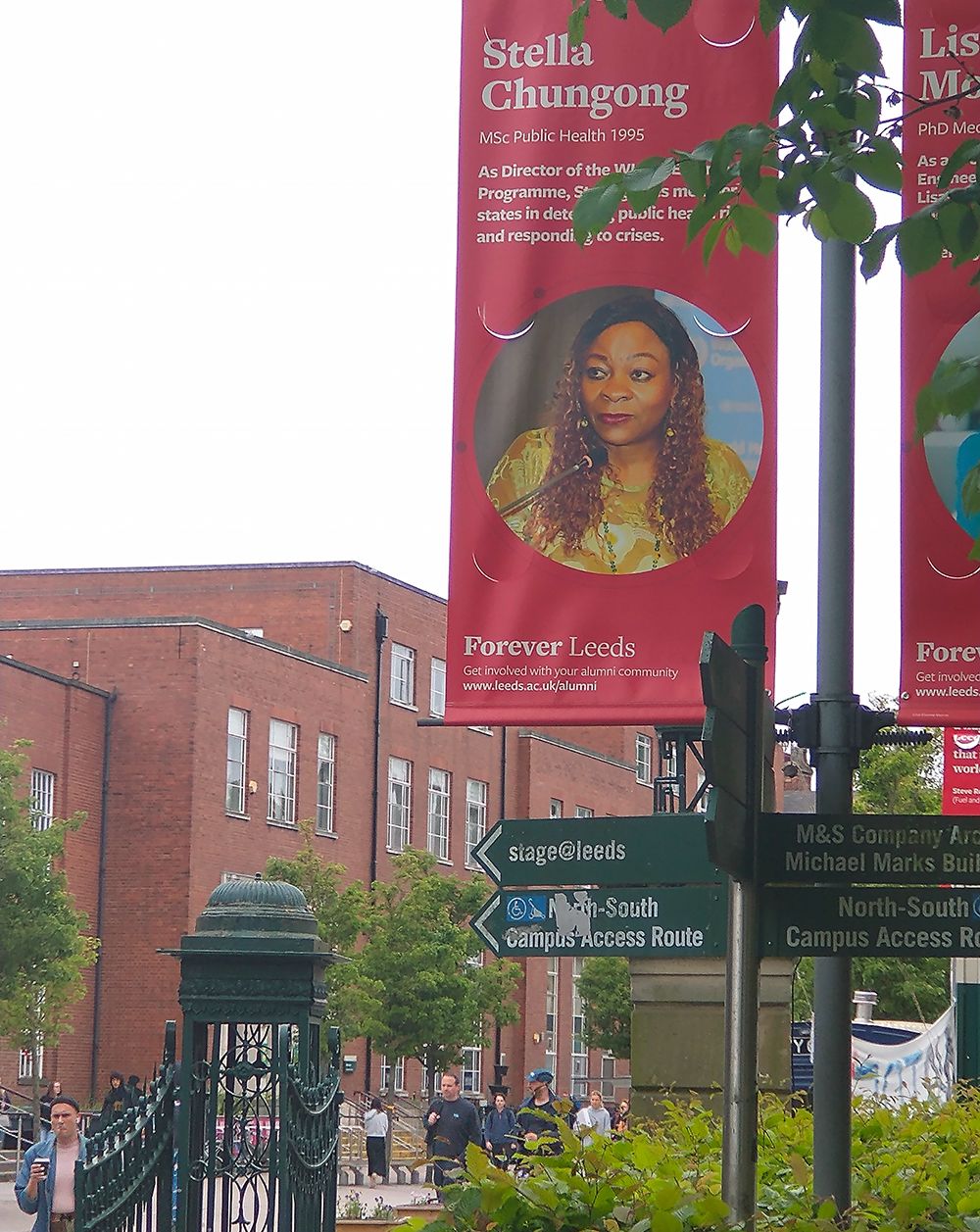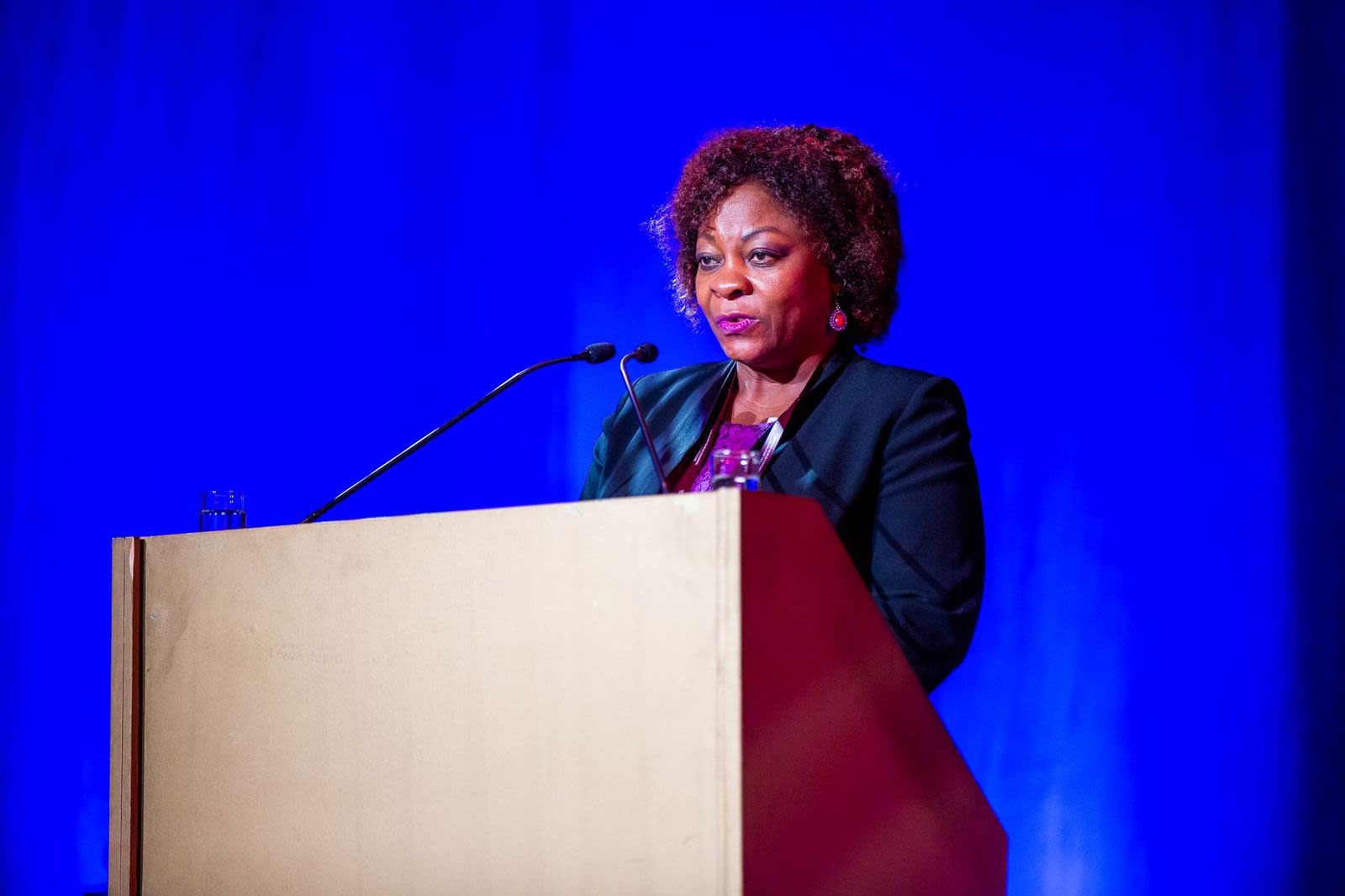Stella Chungong
Director, Health Security Preparedness Department, WHO

Leeds alum prepares the world
Stella is committed to advancing global health security and championing public health initiatives.
As Director, Health Security Preparedness Department at the World Health Organization, Stella leads nations around the world on preparing for health emergencies. She oversees country-level health emergencies preparedness under the International Health Regulations (IHR).
For her serviced to global health, Stella was awarded the Chevalier de l’Ordre du Mérite from the Republic of Cameroon.
She provides evidence-based information for capacity building and actions for emergencies, building strategic partnerships for health security, and strengthening Disaster Risk Management and Resilience. As being the technical lead of the Universal Health and Preparedness Review (UHPR) Secretariat, Stella helps elevate emergency preparedness to the highest levels of government.
You do make a difference to the lives of populations, communities, families and children. Every little bit counts.
She spearheaded the development and implementation of the International Health Regulations Monitoring and Evaluation Framework, as well as global policies, strategies and tools for IHR implementation.
Stella has been at the heart of response to recent well-known health situations around the world. During the Covid-19 pandemic, she provided the global strategy to WHO member states in systematically reviewing their responses to be better prepared for future health emergencies and reduce the impact of disasters.
She also led the WHO global response to Ebola Virus Disease (EVD) in 2014, coordinating response teams across various countries in West Africa. She set up the EVD readiness systems in 19 neighboring countries and managed the Global Outbreak Alert Response Network, bringing over 150 institutions together to provide a concerted support to countries.
Stella has carried out active outbreak investigations, including leading the first investigation of a new syndrome that was later coined as "nodding disease”

A banner featuring Stella flies in the heart of the University of Leeds campus
A banner featuring Stella flies in the heart of the University of Leeds campus
In her own words
Stella tells us about the World Health Organization.
"The WHO’s public health achievements through the years are well known - the eradication of Smallpox, elimination or near-elimination of five tropical diseases, making childhood immunization close-to-universal, reducing the number of annual Polio cases by 99 per cent, leading the way on the first-ever Malaria vaccine, developing new approaches to Tuberculosis control, ensuring access to safe water to countless more people and much more.
"It continues to stand for equitable access to affordable, quality healthcare and we’ll strive for universal health coverage with strong primary healthcare and human resources at its base for everyone.
"But formidable challenges remain. We face a confluence of crises that can roll back the progress and compete for international attention.
What are you doing these days? It's never too late to update your details with us.
"There are armed conflicts and insecurity. There’s the spread of infectious diseases and pathogens and a global pandemic of non-communicable diseases, particularly affecting lower-income countries. There’s also the spread of antimicrobial resistance and drug-resistant pathogens and, of course, climate change.
"Meanwhile, we have misinformation, disinformation and a loss of trust in institutions. Profit-driven industries, including tobacco and alcohol, are among the most significant risk factors for disease, injury and poor health. We have persistent health inequalities – the key barrier on a pathway to health for all and to meeting the UN’s Sustainable Development Goals.
"The convergence of health emergencies, humanitarian and climate crises, economic constraints, and global conflicts make the journey toward health for all more pressing than ever. We must come together as a global community, recognising that we are only as strong as the weakest link. All our interventions must be underpinned by the key principles of solidarity, equity and coherence in our actions.
With the tremendous toll of the pandemic on mental health, it is now being given more attention than ever before.
"However, the Covid-19 pandemic exposed the need for the WHO to have more resources, stronger partnerships with member states and a greater capacity to address emerging and re-emerging health threats. The WHO needs to secure sufficient and predictable funding that matches the value it brings to the world and the complexity of its mandate.
"Current high-level initiatives will have a profound impact on global health. WHO member states are in the process of drafting and negotiating a legally binding instrument to strengthen pandemic prevention, preparedness and response.
"The WHO's Working Group on the IHR is conducting a review of amendments to these regulations, which are legally binding for all 196 state parties to the regulation. We’re also implementing the Global Architecture for Health Emergency Preparedness, Response and Resilience.

What's involved with health security?
"WHO is a key player in coordinating international efforts and promoting public health policies that protect and promote health for all. The Health Security Department at WHO HQ responds to the evolving global health security landscape and supports member states to prepare for health emergencies.
"We’re constantly engaging health organisations and the highest levels of governments to ensure that the most vulnerable communities, in all countries, are better protected from the impact of health emergencies.
"We support the WHO's 194 member states to scale up implementation of the International Health Regulations (IHR), an agreement that protects the public worldwide against the spread of international disease. This involves helping with sustainable preparedness and detection and response to all hazards, risks and emergencies.
I fell in love with public health in Leeds and I’ve never looked back
"Research, development and innovation are important tools for health security. Our evidence-based approach is key to preparing for future epidemics and pandemics. We need to maintain the centrality of science to the WHO’s work and protect the legitimacy of science and scientific institutions.
"To strengthen health security, it is imperative that we have robust foundational health systems in place. For instance, Infection prevention and control cannot be established in the midst of an emergency; they must be integrated into routine health system operations.
"The Covid-19 pandemic exposed the world's lack of preparedness, and it significantly impacted the field of health security. We witnessed the importance of coordinated action on health threats that cross national borders. This led to a greater recognition of global health diplomacy and the need for stronger collaboration between countries and international organizations."
What changes in healthcare do you foresee?
"The pandemic demonstrated that preparedness should be seen as an investment, not a cost. A new pandemic fund has been launched in collaboration with the World Bank, which will provide catalytic funding for countries to address gaps in preparedness, based on their proposals. The second call for proposals is open until the 17th of May with an envelope of funding of US$500 million.
"The price of a lack of investment in public health preparedness was in lost lives and massive economic disruption. If lessons were learned, we’ll develop improved early warning systems, invest in vaccine research and improve public health messaging.
"Communities must be at the centre of this work and they need to be engaged from the start. With marginalized communities disproportionately affected by Covid-19, there’s now a greater focus on addressing health disparities and promoting health equity, including gender-responsive management of health emergencies. This links to a need to address how income, race and education are determinants of health.
Our interventions must be underpinned by the key principles of solidarity, equity and coherence in our actions.
"Changes are already happening. The shift to remote work and telemedicine is making us rethink how healthcare can be delivered. And, with the tremendous toll of the pandemic on mental health, it is now being given more attention than ever before.
"We’re striving for a more resilient and equitable society. Within this context, the WHO's Global Architecture for Health Emergency Preparedness, Response and Resilience was developed to provide stronger and more inclusive management of health emergencies.
"My department has created new guidance on priorities such as Intra-Action Reviews, sustainable preparedness, development of a framework on health systems for health security, urban preparedness and WHO benchmarks for IHR capacities, to name a few and continuously adapts to the global health security landscape."
What are your thoughts about the University of Leeds?
"One of the guiding principles of the WHO's work is the importance of science and evidence-based approaches. Strong academic partnerships have significantly supported member states with their preparedness capacities.
"I thank the University of Leeds for its longstanding collaboration with the WHO, particularly in health security preparedness.
I am proud of Leeds alumni working in medicine, healthcare and social care and who are contributing to global health.
"Leeds has provided significant support in developing and implementing the Health Systems for Health Security framework and in creating the WHO's Framework for Research, Development and Innovation for Health Security Preparedness. I look forward to expanding this partnership with my alma mater."
Do you have abiding memories of Leeds?
"I remember the friendships made in Leeds, some of which I still cherish today. I remember how much I learned about other cultures and perspectives due to the international nature of my programme. I remember going to watch movies in Bradford, and of course, I remember our student parties.
"I also remember meeting kind families, like that of Dr John Walley, who helped make me feel less homesick. Thank you, John, and all the other lecturers who made us feel so welcome."
A remarkable number of alumni have taken their Leeds learning to the top of global institutions – what do you think has led to their success?
"A number of key things came through for me. First, the University of Leeds is known for its academic excellence, with a reputation for high-quality teaching and research across a range of disciplines. This academic rigour prepares graduates well for their careers and gives them the knowledge and skills needed to succeed in their chosen fields.
"Secondly, Leeds has a diverse student body, with students from more than 170 different countries. This diverse environment fosters cross-cultural understanding and collaboration and helps students develop a global perspective that is highly valued by employers.
"Thirdly, Leeds has an international outlook and a strong focus on internationalisation. It has partnerships and collaborations with institutions and organizations around the world. This global perspective gives graduates an edge in the global job market and helps them develop a global mindset.
"Finally, Leeds has a strong focus on innovation and entrepreneurship, with programmes and initiatives to support start-ups and entrepreneurship. This focus on innovation and creativity encourages graduates to think outside the box and pursue new ideas and ventures."
How did your time at Leeds shape your career?
"When I left Switzerland for Leeds some 28 years ago, I was not sure what to expect. I told myself if I didn’t like it, I could always go back to clinical medicine. But I fell in love with public health in Leeds and I’ve never looked back.
All our interventions must be underpinned by the key principles of solidarity, equity and coherence in our actions
"I was allowed to draw freely on experiences I never knew were relevant. I was encouraged to think out of the box, solve problems and find solutions. I was urged to be proactive and assertive, yet learn with humility; to be confident, yet always seek to know more.
"I was encouraged to care about people and how global policies could affect the health and wellbeing of the most defenceless, even in the most remote areas of the world, to influence, even in the smallest way, policies that could affect the lives of the most vulnerable. I was inspired by this University to want more, to do more and to be more.
What message do you have for Leeds alumni who work in health and social care?
"I am proud of Leeds alumni working in medicine, healthcare and social care and who are contributing to global health.
"As healthcare professionals, it is important to stay up-to-date with the latest developments and actively participate in efforts to strengthen capacities in these fields.
"Always strive to learn – about global policies, national strategies, community practices or individual actions. Learn from your experiences, learn from the experiences of others. Be advocates for what you believe in. Help reduce disparities, ensure equitable access to health and healthcare and make health for all a reality.
"You do make a difference to the lives of populations, communities, families and children. Every little bit counts."
Stay in touch with your university. Please update your details here

Forever Leeds
312,000 alumni
197 countries
One global community
Never miss a moment
Update your details
Follow @LeedsAlumni
